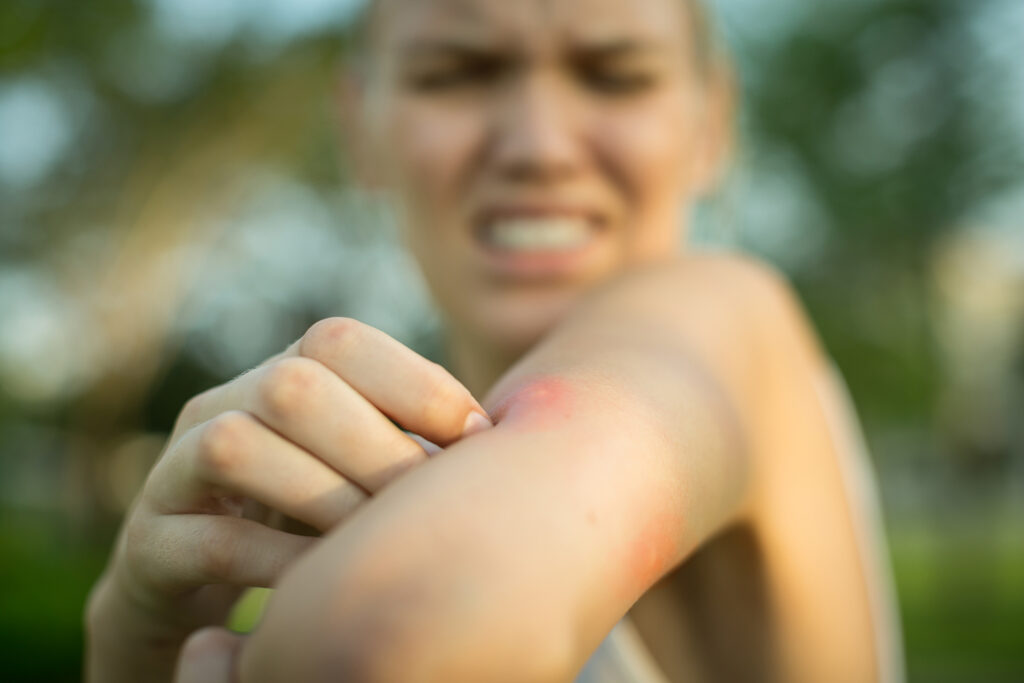How Mosquitoes Bite and Why It Packs a Powerful Itch

Mosquito bites are a common nuisance during warm weather months, leading to itchy and irritating welts on the skin. Understanding how mosquitoes bite and why their bites itch can help you better manage and treat these pesky irritations. Let’s explore the mechanics behind mosquito bites, the reasons for the itch, and how Calagel can provide effective relief.
What Do Mosquito Bites Look Like?
Mosquito bites typically appear as small, round, puffy bumps that become red, hard, and swollen. These bumps often surface within minutes of the bite and can grow larger, especially if scratched. The surrounding area may also become inflamed and warm to the touch. In some cases, a small, dark spot can be seen in the center of the bump, indicating the entry point of the mosquito's proboscis.
Why Do Mosquitoes Bite?
Mosquitoes bite humans and other animals to obtain blood, which provides essential nutrients for egg production. Female mosquitoes are the culprits behind these bites, as males feed primarily on nectar and plant juices. When a mosquito bites, it pierces the skin with its proboscis, a specialized mouthpart that acts like a needle. The proboscis is made of two tubes: one for injecting saliva and another for drawing blood.
The mosquito's saliva contains anticoagulants that prevent blood from clotting and facilitate a smooth feeding process. Unfortunately, this saliva also triggers the body's immune response, leading to the characteristic itching and swelling associated with mosquito bites.
How to Treat a Mosquito Bite
Treating mosquito bites effectively can alleviate itching and reduce inflammation. One of the most effective treatments is Calagel, an antihistamine gel designed to tackle the root cause of the itching: the allergic reaction to mosquito saliva.
Why Calagel Works:
- Antihistamine Properties: Calagel contains antihistamines that help counteract the body's allergic reaction to mosquito saliva. Calagel reduces itching and swelling by blocking histamine receptors, providing quick relief.
- Itch and Pain Reliever – It contains Diphenhydramine HCl, a topical analgesic, that helps relieve the symptoms of pain and itching.
- Versatility: Calagel is not only effective for mosquito bites but also works for other skin irritations, including poison ivy, poison oak, sunburn, and minor burns. Its multi-use functionality makes it a valuable addition to any first-aid kit.
- Clear Application: Unlike traditional calamine lotion, Calagel dries clear, leaving no messy residue on the skin.
How to Prevent Mosquito Bites
Preventing mosquito bites is the best way to avoid the discomfort they cause. Here are some tips to reduce your risk:
- Use Insect Repellent: Apply insect repellent containing DEET, picaridin, or oil of lemon eucalyptus to exposed skin and clothing.
- Wear Protective Clothing: Cover your skin with long sleeves, pants, and socks when outdoors, especially during peak mosquito activity times.
- Avoid Peak Activity Times: Mosquitoes are most active during dawn and dusk. Try to limit outdoor activities during these times.
- Eliminate Standing Water: Mosquitoes breed in standing water. Regularly empty and clean containers that collect water, such as birdbaths, flowerpots, and gutters.
- Use Mosquito Nets: If you're in an area with high mosquito activity, use mosquito nets over sleeping areas and when spending time outdoors.
When Are Mosquito Bites the Most Common?
Mosquito bites are most common during warm weather months, typically from spring to early fall. The exact timing can vary depending on the region and climate. Mosquitoes thrive in warm, humid environments and are more active after rain when there are ample breeding grounds.
Understanding how mosquitoes bite and why their bites itch can help you manage and treat these irritations more effectively. Calagel stands out as a powerful option for relief, tackling the root cause of itching and providing quick, soothing comfort. With preventive measures and effective treatment, you can enjoy the outdoors without the constant discomfort of mosquito bites.




